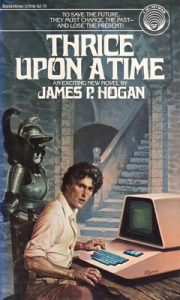I thought the cover was really fascinating and the title was endearing to me. I instantly had an inkling on what the story would entail before having read that, and I think that works in its favor. I haven’t had any experience going through bookstores so it was a bit of an overwhelming search, but there was a whimsical nature to the cover of Thrice Upon A Time so I just had to learn more about it.
In the barest of bones, it’s a story about time travel and exploring its potential limitations and consequences. Time travel is done through sending messages to the past, which then affect the present reality. There are also themes of this mechanism of time travel being controlled by the government and higher forms of power, and how these scientists stumble upon a machine they don’t understand the potential it holds until later in the story.
I would categorize this story as Hard SF, as it primarily uses theoretical mathematics and quantum physics to explain the mechanisms behind the technology used. There were a lot of pages dedicated strictly to theorizing how time travel would even work, and touched on the multiverse as it relates to infinite branching timelines. It also goes without saying that the story is about time travel, and looking at all the different ways things can be altered in these different timelines. I’m not usually a fan of Hard SF, but I could appreciate the amount of thought and care that went into developing this world and the technology. There are also subplots revolving around free will. This primarily relates to the relationships between the characters and whether they’d still come to fruition or end if the timelines weren’t altered by the messages.
I think there was way too much exposition, it was very hard to get through because a lot of the pages were going over the setting and the geography of each location which took me out of the story often. Most of the plot could honestly be taken out, I think the main draw of the story was how it explores relationships affected by timelines. The politics and the overarching bureaucracy, along with the vaccine & virus stuff wasn’t my cup of tea. I didn’t think it added to the story either, because the science behind it didn’t feel realistic to me. There also seemed to be significantly less effort put towards fleshing out the other sciences in this story unrelated to time travel. However, this point towards the plot might be biased because of my affinity towards soft SF and fantasy genres. This isn’t to say that the way James P. Hogan wrote this was necessarily bad, but the stakes felt higher for the relationships in the story, rather than the world succumbing to the deadly illness. I think the message it has about love is surprisingly optimistic, as it seems to validate fate as a force in the universe. Certain characters always find a way back to each other regardless of the timeline alterations. This personally aligns with my view of the world so it’s cool to see it affirmed in text that was written decades ago.
I’d recommend it to anyone interested in time travel as a genre, it’s a really interesting thought experiment the way it deals with timeline manipulation, as well as separate timelines. If you’re a hopeless romantic I would also recommend this story because it handles love in a really cute way!

Works Cited:
Hogan, James. Thrice Upon A Time. New York: Ballantine Books, 1980.
(Tyrese Duncan-Moore)

Hi Tyrese! That cover is … well, something else. I remember when computers looked like that (yikes!), but that paired with a robot (or suit of armor) and a medieval-looking castle is a genre mess! Time travel stories, though, often do that– bring us back to times before modern science and tech. I love that the love-optimism through-line is so strong in this novel. It seems that time-travel plots often have love as a kind of anchor, or compass, for the travelers. The novel _Could Atlas_ (also a great film) is an excellent example of this. Thanks for reviewing this book!
On another note. Hogan was a rather odd character. In his obituary (published in The Guardian in 2010), we learn that “In recent years he appeared to be attracted towards deliberate contrarianism, expressing his scepticism about global warming being man-made, about the cause of Aids and about evolution, in his book Kicking the Sacred Cow: Heresy and Impermissible Thoughts in Science (2004). His purpose seemed to be to question accepted wisdom and apply the methodology one would expect in scientific investigation to physics, history, medicine and other subjects. However, this caused controversy when he praised the quality of research performed by some Holocaust deniers.” https://www.theguardian.com/books/2010/aug/05/james-p-hogan-obituary. We would have to do more research to know if he believed what he was arguing. Either way, it is always tough to read things like this about an author.